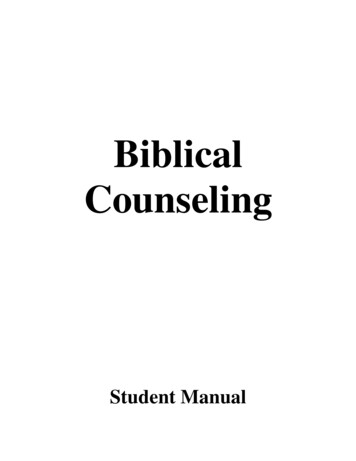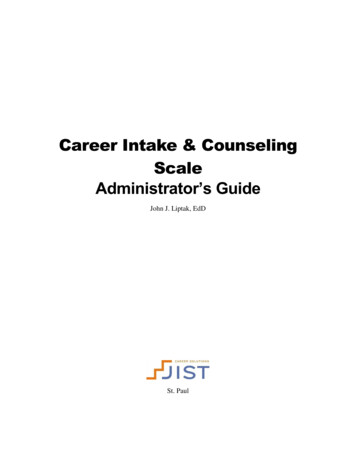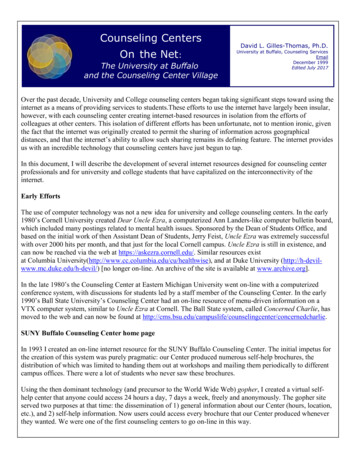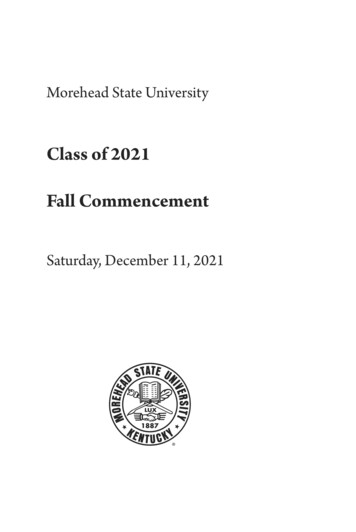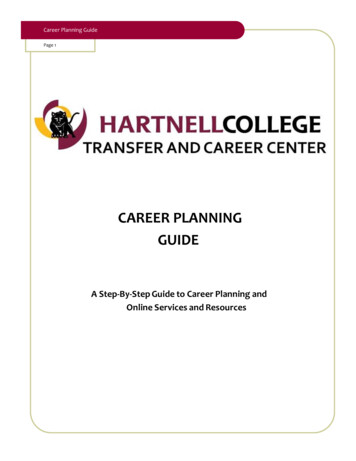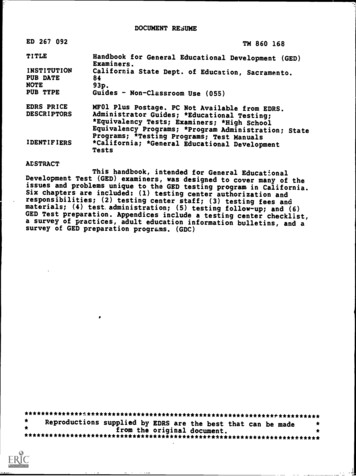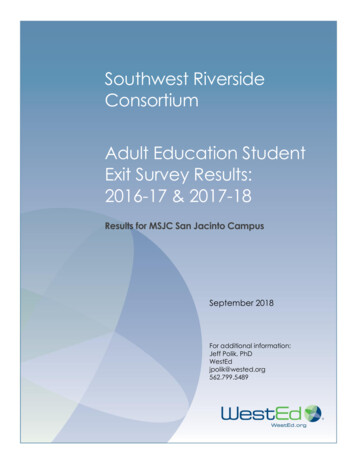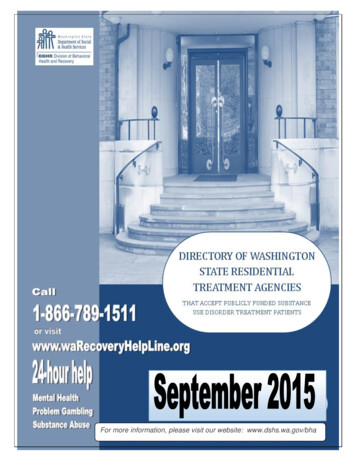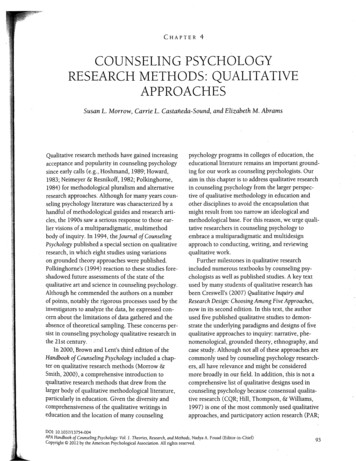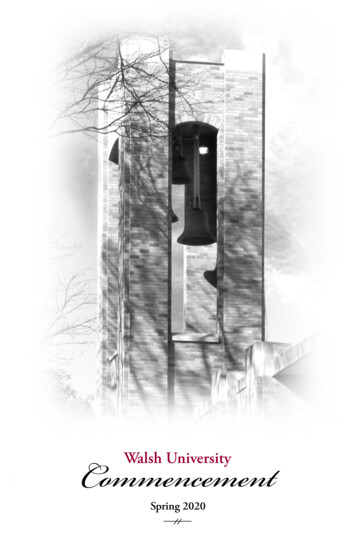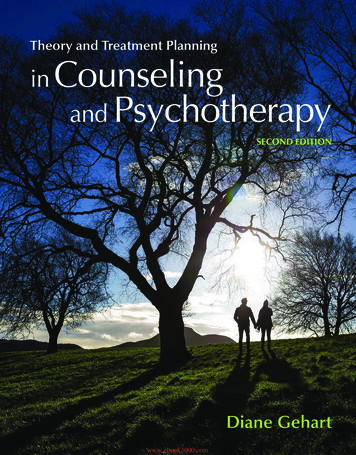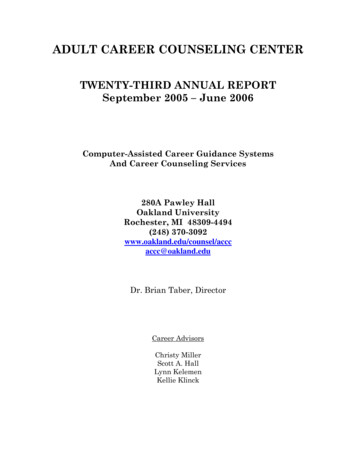
Transcription
ADULT CAREER COUNSELING CENTERTWENTY-THIRD ANNUAL REPORTSeptember 2005 – June 2006Computer-Assisted Career Guidance SystemsAnd Career Counseling Services280A Pawley HallOakland UniversityRochester, MI 48309-4494(248) duDr. Brian Taber, DirectorCareer AdvisorsChristy MillerScott A. HallLynn KelemenKellie Klinck
ACKNOWLEDGEMENTSThe Adult Career Counseling Center (ACCC) could not have become nor continue tobe such a success without the help and continued support of a number of people.We are thankful to our new director, Dr. Brian Taber, for his enthusiasm anddisplayed commitment to continuing the excellent services of the ACCC.Thank you to the following individuals for their contributions: University PresidentGary Russi, Director of Graduate Studies Claire Rammel, Dean of Education MaryOtto, the Counseling Department faculty and staff, Chair Luellen Ramey,Department Secretaries Michael Hill and Barb Smith, SEHS Counseling CenterClinical Director Dr. Elyce Cron, SEHS Counseling Center Supervisor KimSpampinato, and work study students Heather Suggs, Christine Cherba, DianeDraveski, Rachel Padgen and Dipal Jhaveri.Thank you to the University Technology Services (UTS) for the installation andsupport of the computer systems necessary to service our clients.Recognition is also given to the graduate candidates in counseling who served theACCC this year. They are Kellie Klinck, Lynn Kelemen, Scott Hall, and ChristyMiller.Finally, the staff and career advisors of the ACCC would like to acknowledge themembers of the ACCC Advisory Board, extending our sincere thanks for theirsupport and commitment to the efforts of this center. Advisory Board members forthe 2005-2006 year included:Mr. Pat BennettMs. Marsha BoettgerCoordinator, Academic Advising, College ofEngineering & Science,Oakland UniversitySenior Consultant, Talent Management,Daimler-Chrysler CorporationMs. Clarise BolducProgram Coordinator, WorkforceDevelopment Systems, M-TEC, OaklandCommunity CollegeDr. Elyce CronAssociate Professor, Counseling,Oakland UniversityClinical Director, SEHS Counseling Center,Oakland Universityii
Dr. Jane GoodmanProfessor Emerita of Counseling,Oakland UniversityPast Director, Adult Career Counseling CenterMs. Judith HoppinExecutive Director, ProfessionalDevelopment, SEHS,Oakland UniversityMs. Sandy ManoogianMs. Karen PagenetteMs. Julie PugginiDoctoral Student, Oakland UniversityCounseling ProgramDirector, Workforce Development Services,Oakland Community CollegeCo-Director, Pontiac Adult CareerCounseling CenterDoctoral Candidate, Oakland UniversityCounseling ProgramDr. Luellen RameyChair, Counseling, Oakland UniversityDr. Howard SpleteProfessor Emeritus of Counseling,Oakland UniversityFounder, Adult Career Counseling CenterMs. Kim ShultzAcademic Adviser and Career DevelopmentCoordinator, Oakland UniversityMr. Robert ThomasDirector, Career Services,Oakland UniversityMs. Tricia WestergaardCoordinator of Undergraduate AdvisingCollege of Business, OaklandUniversityTABLE OF CONTENTSRecent Developments and History of the Adult Careeriii1
Counseling CenterMission of the Adult Career Counseling CenterDescription of the Adult Career Counseling Center46The Advising Process7ACCC Coordination with SEHS Counseling Center8Description of the Computer-Assisted Career Guidance SystemsAnd Computer Hardware Upgrades9Client Demographics16Analysis of Clients’ Responses to ACCC Exit Survey24Typical Case Studies26Marketing and Public Relations28Visitors to the ACCC29ACCC Advisor Activities30Appendix A – ACCC Disclosure Statement32Appendix B – Auxiliary Services34Appendix C – Brief Report of the Pontiac Adult CareerCounseling Center36iv
RECENT DEVELOPMENTS AND HISTORY OF THEADULT CAREER COUNSELING CENTERRecent DevelopmentsThis year marks the Adult Career Counseling Center’s (ACCC) twenty-third year ofservice. The largest development to happen to the ACCC this year was the hiring ofDr. Brian Taber, Assistant Professor of Counseling at Oakland University, as theDirector of the ACCC. Although this is Dr. Taber’s first year of service, he hasalready supplied the center with outstanding leadership and support. We areexcited about the future of the ACCC under Dr. Taber’s wing.While using standard paper and pencil assessments, we are also using a networkedcomputer system, the newest computer career guidance systems and severalInternet based resources. We also initiated several changes in the operation andenvironment of the ACCC to facilitate improved customer service for the clientsincluding:1. Further revision of our website (www2.oakland.edu/counsel/accc).2. Additional refinement of the networked computer system.3. Continuing refinement of the computerized system for maintaining ACCC clientrecords and usage statistics.4. Utilization of the many new career related websites to assist our clients in theircareer search.5. Continued utilization of the Strong Interest Inventory (SII) and the MBTICombined Report to integrate our clients’ interest and personality from twowidely used assessments.6. Implemented O*Net’s computer based career exploration tools; the WorkImportance Profiler (WIP) and Interest Profiler and Vocopher’s computer basedAdult Career Concerns Inventory (ACCI) and Career Development Inventory(CDI).7. Ordering of various updated career counseling workbooks and guides to keepadvisors on top of the latest career advising resources.These changes have facilitated the efficient and effective provision of services to themembers of our community.History1
The Adult Career Counseling Center (ACCC) has served more than 12,000 clientsduring the last 23 years of service. The vast majority of clients served, at no charge,are community adults. Our clients range in age from 18 years old to over 60 yearsold, and represent a culturally diverse population.The development of the ACCC benefited greatly from the suggestions and support ofGerald Pine, former Dean of the School of Education and Human Services atOakland University. His concept of the Center as being a place for service, training,and research was transformed into our productive Center.The impetus for these programs of public service came from Oakland University'sPresident, Joseph Champagne, in the spring of 1982. A portion of a state line itemallocation provided financial support for the broad purpose of promoting economicdevelopment and retraining unemployed workers in this geographic area.Under the direction of Provost Keith Kleckner, a university-wide committee wasestablished to review possible computer-assisted career guidance systems andrelated counseling programs that could be used to aid adults in this area. Uponrecommendation of this committee, the university purchased five DISCOVER IIcomputer-assisted guidance systems and one SIGI (System of Interactive Guidanceand Information) computer-assisted guidance system in the summer of 1982.Two systems (DISCOVER II and SIGI) were assigned to the Office of AcademicAdvising and General Studies to aid adults of this geographic area who werelooking for assistance in reviewing education and training possibilities. FourDISCOVER II systems were allocated to the School of Education and HumanServices to be utilized by the Counseling department and the Continuum Center inproviding services to the adult population in this area.During the Fall of 1982, committee members Tom Atkinson (Provost's Office),Elaine Chapman-Moore (Student Services), Robert Fink (Psychology Clinic), JaneGoodman (Continuum Center), Ronald Kevern (Placement Office), Pamela Marin(Office of the President), David Meyer (Human Resources and Development Area),and Howard Splete (Counseling Department and Committee Chair), planned for theimplementation of these programs and the coordination of career counseling andinformation services across campus.With the support of Gerald Pine, the ACCC was established in Room 147 of O'DowdHall. After the first computers were programmed, in-service training was providedfor 135 persons, including interested faculty, staff, and student assistants.Since opening in 1982, computer programs used at the ACCC have continually beenupdated to ensure that clients benefit from the most current career counseling toolsavailable. In 1985, a new computer-assisted guidance system, DISCOVER for AdultLearners, was added to meet the unique needs of adults in transition. In 1986 asecond DISCOVER for Adult Learners replaced our DISCOVER II system toprovide a more appropriate system for ACCC clients. In 1987, a new software2
program, SIGI PLUS was added to provide another approach to career explorationfor ACCC clients. Also, a computer-assisted version of the Michigan OccupationalInformation System (MOIS) was obtained as an additional resource for ACCCclients seeking more local information. The Center has tested other softwareprograms such as OPTIM (Occupational Projections and Training for Informationfor Michigan), the Resume Kit, Harris Selectory and Resume Writer. Only thoseprograms that best meet the needs of the clients of the ACCC have been retained.We currently utilize the updated online version of the Strong Interest Inventory,Bridges Choices Explorer, Choices Planner, and www.bls.gov (Occupational OutlookWebsite).The staff of the ACCC stays abreast of the newest developments and resourcesavailable through the Internet. Computer generated information, as well as acollection of monographs and other print materials, allow for a more comprehensiveservice to be offered to our clients.In addition to the center’s use of computer-assisted career guidance, we also use anumber of other helpful resources. These include Campbell’s Interest and SkillsSurvey (CISS), the Myers-Briggs Type Indicator (MBTI), Strong and MBTICombined Report, Self-Directed Search (SDS), O*Net’s Work Importance Profiler(WIP) and Interest Profiler, Adult Career Concerns Inventory (ACCI) and CareerDevelopment Inventory (CDI), and Card Sorts Assessment Instruments.The location of the ACCC has also changed during our twenty-third year history. In1993-94, the ACCC was relocated from two large rooms to four private offices and areception area to provide more efficient services and privacy for clients. During the1996-97 academic year, our office environment changed again to include an officeadjoining that of the Practicum Supervisor, with an additional large meeting room,and two smaller private meeting areas. Just prior to the 1997-98 year of service, ouroffices were relocated and changed to include one office and three small meetingrooms.In August of 2002, we moved to the brand new Pawley Hall on Pioneer Drive.There, we have four devoted offices, a client waiting area, and a sharedmeeting/group room. This beautiful new facility is another wonderful opportunityto improve the services that we provide.MISSION OF THEADULT CAREER COUNSELING CENTERGoals of the ACCCOur mission is to:3
1. Provide career exploration and planning opportunities to community adults at nocharge.2. Train faculty, staff, and students in the use of computer-assisted career guidanceprograms.3. Support research efforts for a better understanding of the career developmentneeds of adults.Objectives and Corresponding Means of FulfillmentGoal 1:To provide career exploration and planning opportunities to communityadults at no charge.ObjectivesActivitiesA. To aid clients in self-analysis relatingIn-depth one-on-one or groupto their interests, values, abilities,discussions, other assessmentand experiences.tools and informal exercises such asworksheets and card sorts.B. To provide job information pertainingUse of Bridges, MOIS, theto careers of interest, such as salary Occupational Outlook Handbook,ranges and job growth rates.O*Net’s Occupational InformationNetwork, Career One Stop (websites),and other internet resources.C. To aid clients in the process of takingthe next step.Provision of individual advisingsessions, school or training programselection, resume preparation, honinginterviewing skills, and informationalinterviewing.Goal 2:To train faculty, staff, and students in the use of computer-assisted careerguidance programs.ObjectivesActivitiesA. To train faculty and staff.Provision of in-service sessions.4
B. To train graduate counseling students.Provision of in-service trainingfor students in CNS 640 CareerCounseling Theory andPractice, and CNS 664Counseling Practicum.Goal 3:To support research efforts for a better understanding of the careerdevelopment sphere, ultimately promoting better career guidancepractices for adults.ObjectivesActivitiesA. To support master's level research.Support of ACCC advisor’s researchactivities at the Center.B. To support doctoral research.Provision of facilities and support forresearch by faculty and doctoralstudents.DESCRIPTION OF THEADULT CAREER COUNSELING CENTERServices ProvidedThe ACCC provides advising services at no charge for adults who are seekingguidance with career-related issues. The ACCC services include exploringoccupational information, facilitating self-awareness, assisting in resume5
preparation, developing interviewing skills, and offering referral information. Fourgraduate assistants, who are students in the Oakland University Master of Arts inCounseling program, render these services.Clients typically attend between three to ten sessions to thoroughly explore thecomputerized career guidance programs, the paper and pencil assessments,informal assessments, and to discuss possible action plans for the future. Becauseof the number of return clients and the state of Michigan economy, the ACCCschedule book is usually full.The computer-assisted career guidance programs currently used in the ACCC areCX Bridges, Michigan Occupational Information System (MOIS), Strong InterestInventory (SII), Campbell Interest and Skills Survey (CISS), and O*Net’sWork Importance Profiler and Interest Profiler software-based programs. Thesystems we currently use aid adults in learning how their interests, abilities, lifeexperiences, and values are related to possible occupations and/or educational andtraining opportunities. In-service training on these programs has also beenprovided each semester to students in CNS 664, Counseling Practicum.Depending on the needs of the client, other assessment instruments may be used.These include the Myers-Briggs Type Indicator (MBTI), Career Beliefs Inventory(CBI), Adult Career Concerns Inventory (ACCI), Career Development Inventory(CDI), and Self-Directed Search (SDS). The ACCC also has available a collection ofprint materials to supplement the services provided.Telephone assistance, in some instances, is another service provided by the ACCC.Often advisors will provide referrals to other departments on campus, such asCareer Services, Academic Services, Advising Resource Center, SEHS CounselingCenter, International Studies and Advising, the Education Department, and otherservices off campus, such as the Troy Career Center, and Pontiac Adult CareerCounseling Center.6
THE ADVISING PROCESSA client schedules an initial one-hour appointment to meet with an ACCC CareerAdvisor.The ACCC Advisor gathers background data during an intake interview to identify theclient's purpose(s) for using the Center and to establish goals to guide the careercounseling process.The client is provided with an overview of the computer programs and servicesavailable at the ACCC and through other departments offering counseling services onthe Oakland University campus. The client is given a copy of the ACCC DisclosureStatement (see Appendix A), which describes the responsibilities of a Career Advisorand the rights of the client. Referrals to the SEHS Counseling Center or otheruniversity and community resources may be made dependent on the specific needs ofthe client.Clients are scheduled for subsequent appointments that are typically fifty minutes toan hour and one-half in length.Based on the client's specific needs, the ACCC Advisor determines which computerassisted career guidance program(s), informal exercises, and/or standardized paper andpencil assessment(s) would be most appropriate. The ACCC Advisor then facilitatesthe use of these assessment tools.The ACCC Advisor provides assistance and an explanation of the results obtained fromthe computer-assisted career guidance program(s) or the standardized paper and pencilassessment(s).To fully explore the client's career issue(s), the ACCC Advisor may include additionalcareer exploration instruments such as personality assessments, card sorts, and one-onone discussion throughout the process. Within recent years, an ACCC CareerExploration Group has also become an option for clients.The outcomes of any additional career guidance instruments are interpreted, inconjunction with the results of the data obtained from the initial assessments, toprovide the client with the comprehensive information necessary to facilitate thedecision-making process.Prior to the termination of the counseling relationship, the ACCC Advisor and clientdiscuss the next steps the client may want to take. Upon completion of the counselingprocess, the client is asked to complete a short exit survey to evaluate the servicesprovided by the advisor.7
ACCC COORDINATION WITHSEHS COUNSELING CENTERFor a number of years the SEHS Counseling Center (SEHSCC) and the ACCC havehad a mutually beneficial partnership. Dr. Elyce Cron, Clinical Director andAssociate Professor, Kim Spampinato MA LPC, current Coordinator of theSEHSCC, and Heather Suggs MA LPC, Doctoral Graduate Assistant, further servesto foster this relationship. Throughout the year, the staff of both centers will meetto stay abreast of events happening with each.It is a common practice for clients who have utilized the services of the ACCC to bereferred to the SEHSCC for their more comprehensive array of services. A referralmay be made to the SEHSCC because the client needs more in-depth exploration ofa career issue, or may have additional issues or concerns that require personalcounseling.SEHSCC counselors are also in-serviced by the ACCC Advisors. (Please refer tosection entitled, "In-service training” on page 30). This training focuses on anoverview of formal and informal assessments used by the ACCC. In addition, thePontiac Adult Career Counseling Center student counselors have an opportunity toget acquainted with the Strong Interest Inventory software and other computerizedassessments offered by the ACCC.Having the ACCC in such close proximity, and serving such a supportive role to theSEHSCC, enriches the services SEHSCC counselors can deliver to their clients. Atthe same time, the SEHSCC offers ACCC clients the option of continued in-depthcounseling free-of-charge. The partnership of these two centers allows for theprovision of quality comprehensive counseling services to members of thecommunity.8
DESCRIPTION OF THE COMPUTER-ASSISTEDCAREER GUIDANCE SYSTEMSAND COMPUTER HARDWARE UPGRADESStrong Interest Inventory (SII) SoftwareTo better assist our clients in receiving the results of the SII, we continue to use thecomputerized version of the SII that allows the client to enter his or her answersdirectly onto the computer and receive, within minutes, the results.Strong Interest Inventory (SII)Designed to identify general areas of interests as well as specific activities andoccupations for further career exploration. The report results identify generaloccupational themes, basic interest scales, occupational scales, and personal stylescales. The assessment is administered and the report is printed via the Internet.Strong and MBTI Career ReportThe combined Strong Interest Inventory and MBTI report enables the ACCC tocombine a client’s MBTI code with their Strong Interest Inventory results. Thisreport provides the client a clear picture of how personality factors often enmeshwith one’s interests. The report identifies suggested career search strategies andrecommends occupations with emphasis on those suggested by both instruments.Campbell Interest and Skill Survey (CISS)The CISS Assessment System software enables the ACCC to administer the. TheCISS assists in matching self-reported interests and self-reported skills to theoccupational world. Both interest and skill scores are presented to allowcomparisons between an individual’s strength of interest and strength of selfconfidence for the areas measured. The CISS is administered via computer, andelectronically stores client data and assessment results.O*Net Interest ProfilerThis instrument is an exploration tool that can help clients discover the type ofwork activities and occupations that they would like and find exciting. Clientsidentify and learn about broad interest areas most relevant to them. They can usetheir interest results to explore the world of work.The O*NET Interest Profiler measures six types of occupational interests: Realistic Social Investigative Enterprising9
Artistic ConventionalInterest Profiler Strengths Compatible with Holland's R-I-A-S-E-C Interest Structure.o rich and extensive research history,o widely accepted and used by counselors,o easy to use and well received by clients. Interest items represent a broad variety of occupations and complexity levels. Extensive and thorough development effort.o client input during all stages,o construct validity and reliability evidence. Can be self-administered and self-interpreted. User Guide provided for workforce development professionals. Can be used on a stand-alone basis or with other O*NET Career ExplorationTools or with privately developed instruments. Results can be directly linked to over 900 occupations in O*NET OnLine(http://online.onetcenter.org/). O*Net Work Importance ProfilerThe O*NET Work Importance Profiler (WIP) is a new computerized self-assessmentcareer exploration tool that allows customers to focus on what is important to themin a job. It helps people identify occupations that they may find satisfying, based onthe similarity between their work values (such as achievement, autonomy, andconditions of work) and the characteristics of the occupations.The O*NET Work Importance Profiler is administered by computer. Participantsuse the WIP to indicate the importance to them of each work need, in two differentsteps. In Step 1, participants rank order the twenty-one work need statements bycomparing them to one another and ordering them according to their relativeimportance. In Step 2, they rate the work needs by indicating whether or not theneed is important independent of the other work need statements. Users receive aprofile of their work values that:1. help them develop valuable self-knowledge about their work values,2. foster career awareness, and3. provide a window to the entire world of work via the 900 occupations withinO*NET Online.The O*NET Work Importance Profiler measures six types of work values: Achievement Relationships Independence Support Recognition Working ConditionsWork Importance Profiler Strengths Based on over 30 years of research by leading vocational psychologists, Extensive and thorough development effort,10
stakeholder input during all stages,construct validity and reliability evidence.Can be self-administered and self-interpreted.Computer administration via single computer or computer network.Can be used alone or with other O*NET Career Exploration Tools or withprivately developed instruments.Results provide a window to over 900 occupations in O*NET OnLine(http://online.onetcenter.org/).oo Vocpher’s Adult Career Concerns Inventory (ACCI) andCareer Development Inventory (CDI)What is Vocopher?Vocopher is a collaboratory involving academic professionals, career counselors,and professional web developers. The purpose of Vocopher is to provide researchersand counselors with career resources with which to further their research andassist their clients respectively. These services are provided free of charge in thehope that others will join us in this collaborative effort. With the permission andencouragement of the CDI an ACCI authors, the assessments are now available atno charge on the internet at http://www.vocopher.comThe Adult Career Concerns Inventory (ACCI).The ACCI operationally defines Donald Super’s model of career adaptability inadulthood. This was later revised by Super and Savickas to focus on careeradaptability and career construction. This model does not view careers as linear,rather, they are subject to transitions and fluctuations influenced by economic,social, and psychological variables. Such transitions can be a major cause ofconcern, especially those that are not planned.In our current world of work occupations have become less predictable and lessstable. As a result we are now likely to see individuals making increasinglyfrequent transitions to different jobs and occupational fields. Successful individualswill be those who proactively reassess their work-life situation, explore newpossibilities, and plan their transitions accordingly. Career management andadaptability are now the keys to career construction.The ACCI contains 61 items and takes approximately 20 minutes to complete. Thefirst 60 items ask individuals to indicate their current level of concern related tocurrent career activities. The questions relate to 4 career activities, Exploration,Establishment, Maintenance, and Disengagement.The ACCI can be used:11
In career counseling and planning to identify the career activity, and specificdevelopmental tasks, an individual is most concerned with.As a needs assessment when administered to larger groups. Focused interventionscan be advised based on identified career concerns.To teach career construction theory to counselor trainees.The Career Development Inventory (CDI).Interest inventories are commonly used to assist young adults with vocationalchoices. However, the results of such instruments offer little value if the individuallacks the requisite attitudes and competencies required to make sound vocationaldecisions. The Career Development Inventory (CDI), created by Albert Thompson,Richard Lindeman, Donald Super, Jean Pierre Jordaan, and Roger Myers, can beused before administering an interest inventory to measure an individual’sreadiness to make vocational choices, or with an interest inventory to determinehow best to interpret the interest inventory results.The CDI operationally defines Super’s structural model of career choice readinessamong adolescents and emerging adults. Inspired by the construct of readingreadiness, Super, at mid-century, reasoned that the readiness to and resources formaking fitting educational and vocational choices emerged during childhood anddeveloped during adolescence. He spent nearly 40 years identifying the criticalattitudes and competencies that lead to sound educational and occupationaldecisions, constructed inventories to measure these attitudes and competencies, andthen studied their development in students from middle school through college.When all scales on the CDI are high, this indicates the individual has the requisiteattitudes and competencies required to make sound educational and vocationaldecisions. We can then place more confidence in the results derived from interestinventories.Most importantly, scores should be used to:Raise a student’s awareness of imminent and future vocational decisions.Instill a sense of curiosity about the world of work and one’s place in it.Stimulate discussion about current and future vocational choices.MOIS (Michigan Occupational Information System)The MOIS program is also updated on an annual basis. It is an easy-to-use systemof occupational and educational information specifically designed for the state ofMichigan. Internet links are provided throughout the program.12
The system evaluates client input and provides a list of job titles that are mostapplicable to the client's data. The client may then explore MOISCRIPTS(occupational descriptions) for the occupations in which they are most interested.Currently MOIS offers 439 MOISRIPTS. Individuals with a specific occupation inmind can bypass the structured search and go directly to the MOISCRIPTS forcareer information. MOISCRIPTS cover areas such as:* Specific job duties* Working conditions* Methods of occupational entry* Salaries and wages* Employment outlook* Educational requirements* Tips for finding additional informationOther segments included in MOIS give information on many different areas suchas:* Transition planning* Financial aid considerations and documents* Decision-making* Successful job search strategies* How to start a small business(This section includes how to develop a business plan, cash flow andbookkeeping considerations, home-based and franchised businesses, andeven a sample business loan application.Bridges Choices Explorer and Choices PlannerThe Adult Career Counseling Center continues to use Choices Explorer. This siteallows clients to look at careers from a personal point of view, and obtain in-depthand current occupational information. Choices Planner offers the client similar aservice, however, this site is geared toward clients who are planning their stepstowards a new career.What Is Bridges?Bridges is designed to help clients make informed career decisions. One of thegreatest advantages to this site is that it is found on the Internet and updated daily(http://bridges.com). Every day there are 4-5 new articles focusing on careerinformation, skill development, labor market development, emerging employmentopportunities, and recreational activities.Bridges has made a commitment to make it their priority to keep this site as userfriendly as possible, and from our experiences here at the ACCC, they have done agreat job. They have also made it clear to the ACCC that if any problems come up,or if there are any occupations missing, to contact them and they will make surethat the site is updated within a week.13 page
Oakland University Ms. Sandy Manoogian Doctoral Student, Oakland University Counseling Program Ms. Karen Pagenette Director, Workforce Development Services, Oakland Community College Co-Director, Pontiac Adult Career Counseling Center Ms. Julie Puggini Doctoral Candidate, Oakland University Counseling Program
